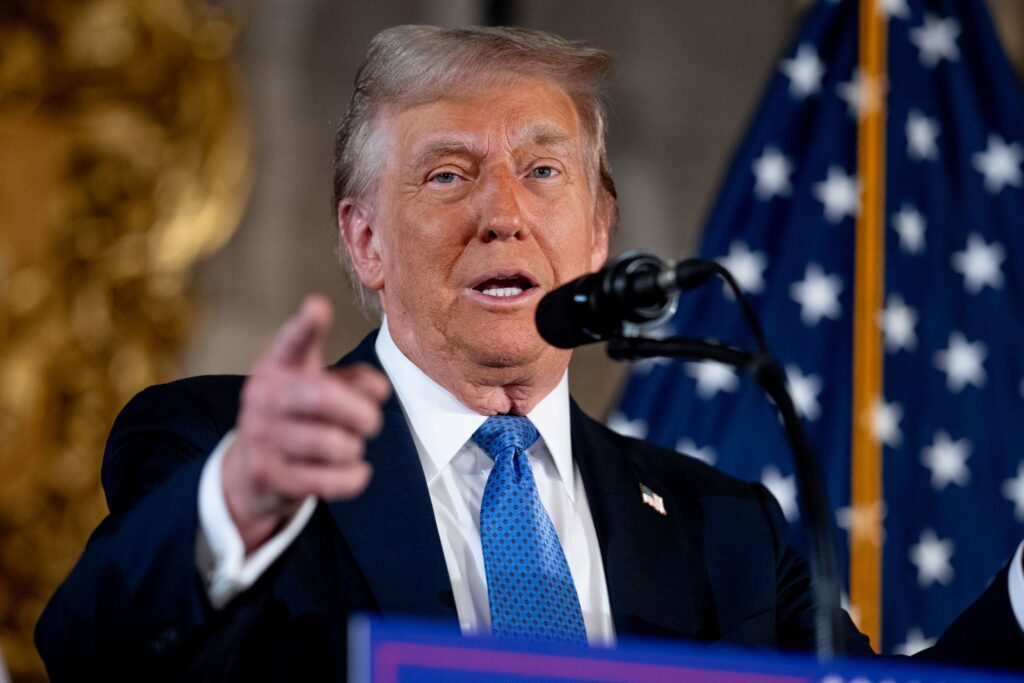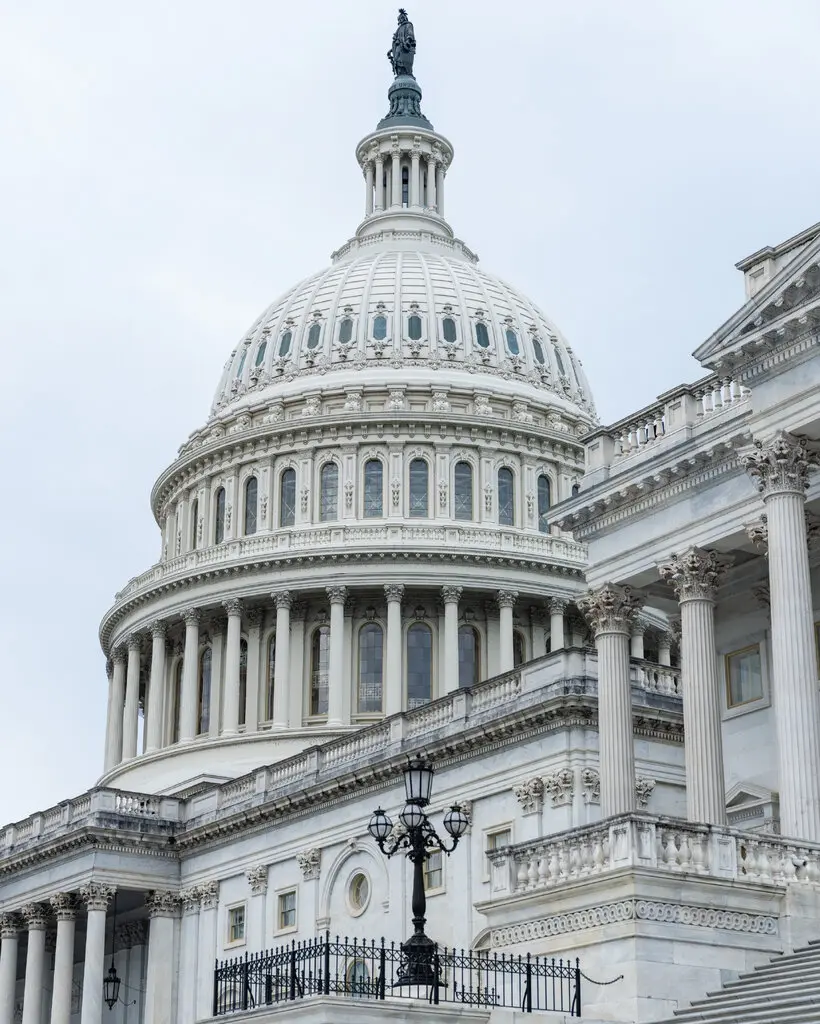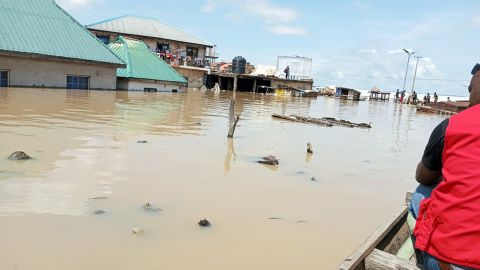
PALM BEACH, FLORIDA - DECEMBER 16: U.S. President-elect Donald Trump speaks at a news conference at Trump's Mar-a-Lago resort on December 16, 2024 in Palm Beach, Florida. In a news conference that went over an hour, Trump announced that SoftBank will invest over $100 billion in projects in the United States including 100,000 artificial intelligence related jobs and then took questions on Syria, Israel, Ukraine, the economy, cabinet picks, and many other topics.
 Top Democrats are facing a base that is spoiling for a spending fight.Credit…Eric Lee for The New York Times
Top Democrats are facing a base that is spoiling for a spending fight.Credit…Eric Lee for The New York Times
Where Things Stand
-
Stopgap bill: The chances of a government shutdown rose on Tuesday after top Democrats in Congress said they opposed Republicans’ stopgap plan to fund the government past a Sept. 30 deadline. Their opposition reflected rising anger at President Trump’s policies and his efforts to circumvent Congress. The standoff sets up a replay of a similar scuffle in March, when Democratic senators enraged liberal activists by allowing another stopgap bill to go forward. Read more ›
-
Patel hearing: Kash Patel, the F.B.I. director, traded barbs with Democratic senators on the Judiciary Committee as he faced questions about his leadership. He called Democrats “disgraceful” for asking informational questions and engaged in shouting matches with Senators Cory Booker and Adam Schiff. The committee’s Republicans were much more welcoming of Mr. Patel, who came under increased scrutiny after releasing false information after the killing of Charlie Kirk.
-
Bondi backlash: Attorney General Pam Bondi is facing criticism from supporters of Mr. Kirk and other conservatives after announcing she would “absolutely target” protesters engaging in “hate speech” — which Mr. Kirk wrote last year does not exist under the Constitution
House passes D.C. crime bills as Trump crackdown continues.

The Republican-led House on Tuesday passed legislation to allow stricter criminal penalties for younger offenders in the District of Columbia, moving to overhaul the city’s criminal justice system as President Trump continues his crackdown on the city.
The pair of bills, which both drew some support from Democrats, are part of a package House Republicans are pushing through this week to impose tighter federal control over Washington, as federal officers and the National Guard still patrol the streets and Mr. Trump threatens to again take over the local police force.
One measure would lower the age at which children accused of certain violent crimes can be charged as adults, from 16 years old to 14 years old. That would make them eligible for harsher sentences and adult prisons — a policy change Mr. Trump has called for. Several states have similar provisions, and eight Democrats joined Republicans to pass the measure by a 225-to-203 vote.
The other would roll back a local law that allows judges to give more lenient sentences to people younger than 25, by lowering the limit on that law to 18 years old and requiring judges to adhere to mandatory minimums for youth offenders. Dozens of Democrats joined Republicans to pass the bill, 240 to 179.
Later this week, the House is expected to vote on two other measures that would remove restrictions on vehicular police chases and give the White House a freer hand when choosing judicial picks for D.C. courts, by abolishing a local commission to recommend them.
All four bills may face challenges in the Senate, where they will require the support of Democrats in order to bypass a filibuster and be considered for a vote. But Republicans have long turned to crime as a wedge issue, particularly during campaign season, and Democrats have at times joined them in imposing the federal government’s will on D.C.
The House’s package of bills also comes as Mr. Trump undertakes a federal crackdown on crime in Washington that appears to be the largest infringement on the city’s autonomy since the 1973 law that gave the District’s residents limited authority over their own affairs.
Even as violent crime in Washington has steadily declined over the last year, Mr. Trump last month deployed thousands of National Guard troops and hundreds of federal law enforcement officers to the city. On Monday, he signed an order to authorize sending the National Guard to Memphis, and he has suggested similar surges in Chicago and New Orleans.
But unlike other cities, the District of Columbia is subject to significant federal oversight that allows Congress to review its legislation and rewrite its laws. The roughly 700,000 residents of the District, many of whom are Black, do not have a vote in Congress but are represented by a nonvoting House delegate, Representative Eleanor Holmes Norton, who can serve on committees but cannot vote on bills.
Republicans have proven eager to exercise their authority in recent years. On Thursday, the House Oversight Committee, the panel that oversees Washington, will question D.C.’s mayor, attorney general and city council chairman over the city’s crime policies.
The panel’s Republican chairman, Representative James R. Comer of Kentucky, framed the bills passed on Tuesday as a necessary corrective to “D.C.’s soft-on-crime policies” that he said had “failed to keep D.C. residents and visitors safe.”
But Democrats framed the legislation as aggressive interference by lawmakers who did not represent the city.
“Local leaders should be empowered to solve local problems without Congress interfering,” Representative Robert Garcia of California, the top Democrat on the Oversight Committee, said on the House floor. “I have said this many times: If Donald Trump wants to run D.C., he should resign as president and run for mayor.”
The measures that the House passed on Tuesday both target youth crime, a frequent focus of Mr. Trump and his allies as they deliver broadsides against Democrats in Washington and elsewhere for policies that they describe as overly lax. Jeanine Pirro, the U.S. attorney in D.C., has frequently complained about laws that limit the prosecution of young offenders.
Local officials in Washington have long been focused on crimes committed by teenagers, and the issue became particularly resonant amid a spate of carjackings during the coronavirus pandemic.
But lawmakers in the city have also tried to balance calls for a tougher stance on juvenile crime with an effort to address the socioeconomic problems that many experts say are the root causes of youth crime.




More Stories
2025 FLOODS: KOGI GOVERNMENT CALLS ON FEDERAL GOVERNMENT, INTERNATIONAL BODIES TO GIVE MORE ATTENTION
LIVE: Israel k**ls more than 60 Palestinians in war-devastated Gaza
Trump says TV networks opposed to him should ‘maybe’ lose licence